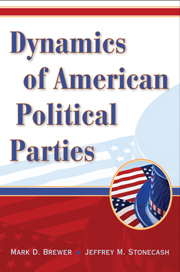Book contents
- Frontmatter
- Contents
- Figures and Tables
- Preface
- 1 DEMOCRACY, REPRESENTATION, AND PARTIES
- 2 OVERVIEW: SOCIAL CHANGE AND SHIFTING PARTY BASES
- 3 TAKING SHAPE: PARTY COALITIONS IN THE POST-BELLUM NINETEENTH CENTURY
- 4 REPUBLICAN ASCENDANCY AND DEMOCRATIC EFFORTS TO RESPOND, 1896–1928
- 5 TABLES TURN: THE NEW DEAL ERA AND DEMOCRATIC DOMINANCE, 1932–1948
- 6 THE DEMOCRATIC DRIVE TO THE GREAT SOCIETY
- 7 REPUBLICANS: REASSERTING CONSERVATIVE PRINCIPLES AND SEEKING A MAJORITY
- 8 THE STRUGGLE OF DEMOCRATS TO INTERPRET CHANGE AND RESPOND
- 9 GEORGE BUSH AND FURTHER POLARIZATION
- 10 THE 2008 ELECTION AND ITS INTERPRETATION
- 11 PARTIES AND THE PURSUIT OF MAJORITIES
- Bibliography
- Index
- References
6 - THE DEMOCRATIC DRIVE TO THE GREAT SOCIETY
Published online by Cambridge University Press: 05 June 2012
- Frontmatter
- Contents
- Figures and Tables
- Preface
- 1 DEMOCRACY, REPRESENTATION, AND PARTIES
- 2 OVERVIEW: SOCIAL CHANGE AND SHIFTING PARTY BASES
- 3 TAKING SHAPE: PARTY COALITIONS IN THE POST-BELLUM NINETEENTH CENTURY
- 4 REPUBLICAN ASCENDANCY AND DEMOCRATIC EFFORTS TO RESPOND, 1896–1928
- 5 TABLES TURN: THE NEW DEAL ERA AND DEMOCRATIC DOMINANCE, 1932–1948
- 6 THE DEMOCRATIC DRIVE TO THE GREAT SOCIETY
- 7 REPUBLICANS: REASSERTING CONSERVATIVE PRINCIPLES AND SEEKING A MAJORITY
- 8 THE STRUGGLE OF DEMOCRATS TO INTERPRET CHANGE AND RESPOND
- 9 GEORGE BUSH AND FURTHER POLARIZATION
- 10 THE 2008 ELECTION AND ITS INTERPRETATION
- 11 PARTIES AND THE PURSUIT OF MAJORITIES
- Bibliography
- Index
- References
Summary
The New Deal dramatically changed the role of the federal government in the United States. The Social Security Act of 1935 established a national program to provide for the elderly and the disabled. For the first time, the federal government assumed some responsibility for the unemployed by making it attractive for states to implement unemployment insurance. Federal expenditures on and responsibility for public works programs of all shapes and sizes increased exponentially. Regulation and oversight of financial markets and other important segments of the economy expanded significantly, and in a long-sought victory by labor activists, the federal government used its coercive power to ensure workers the right to organize and bargain collectively.
Taxation expanded as well in order to fund all of this new government activity. Franklin Roosevelt and his fellow Democrats in Congress responded to the Great Depression and made federal government action legitimate and even desirable, at least to most Americans. World War II further expanded the role of the national government. Tax levels increased again, and still more federal agencies were established. To many it seemed clear that the political dialogue, and indeed the public mood itself, had shifted to the left. Government was not a destroyer of freedom, but rather a source of assistance and an actor to make sure that no interest had undue influence and that no American was unduly left behind.
- Type
- Chapter
- Information
- Dynamics of American Political Parties , pp. 81 - 103Publisher: Cambridge University PressPrint publication year: 2009



